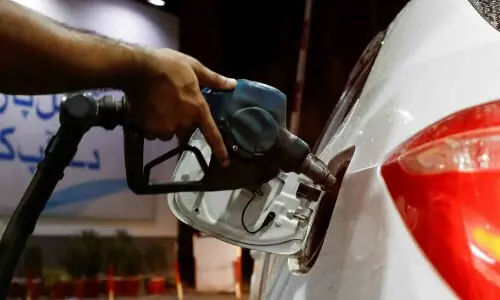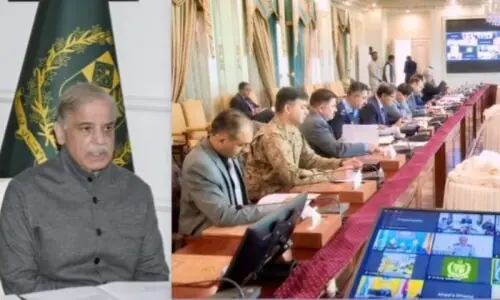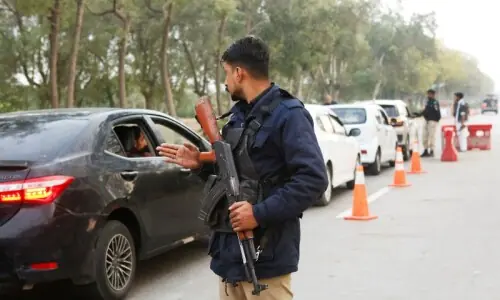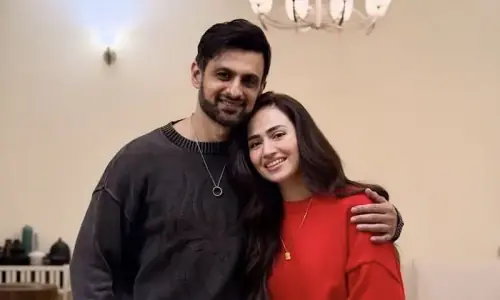Over the last few years many friends urged me to write my memoirs. These flattering requests came from Pakistanis as well as the people I met abroad during my life of incorrigible drift from one organisation to the other and one country to the next. It has been an extremely interesting life though not a monetarily rewarding one as I never intended to amass any assets. My riches are of a different nature.
I enjoyed the friends I made all over the world, and now, looking back I, like Edith Piaf, regret nothing. I often re-read the great Urdu poet Mirza Ghalib’s couplet that after his death people will find only letters from his friends and some pictures of damsels in his tattered baggage. What I write is what I remember, however imperfectly. The only ‘archival’ help I’ve had is my appointment diary of 50 years, which is useful to jog my memory.
I was born in 1930 in Bareilly in India and studied at the Bareilly College until the age of 17 when I left for Pakistan. My father was a nationalist who had Congress sympathies. My father’s close friend Rafi Ahmad Kidwai was a minister in the first UP cabinet formed by the Indian National Congress in 1937. He and my father were friends from their days at Aligarh College.
One of my earliest memories is of my father giving a dinner in his honour; he invited lot of local congressmen. I was called to meet him but I refused to shake hands, saying that he is a congresi mussalman. I was influenced by the atmosphere in the locality and the views of Muslim teachers at school. I was only eight years old, and a rude, if honest, lad.
Later, as a college student, I became active in the Muslim Student Federation and due to my strenuous devotion friends soon started calling me ‘Sayeed Jinnah’. At the start of World War II, Congress ministers resigned and their leaders were sent to prison. The Muslim League observed deliverance day and got a chance to promote itself in their absence. The mocking irony was that Kidwai Sahib now was lodged in the central prison of Bareilly where I was asked to accompany the cook to deliver the food to him and his friends daily. Prison authorities were obliging as they knew that their guests sooner or later were going to rule independent India.
One incident I remember was that during my teen years I was given a clay pot full of faeces to throw at Maulana Husain Ahmad Madani. I actually did so but it fortunately fell well short of the platform where he sat. I felt very ashamed afterwards. Both the rigid politics of the Muslim League and the failure of the Congress to understand Jinnah’s point of view and make adequate concessions contributed to the partition of the country. Still a firebrand, I departed for Pakistan at independence in 1947, leaving my parents and relations behind.
I arrived safely and decided to enrol in Government College, Lahore where Prof Ahmad Shah (Patras) Bokhari interviewed me. After scanning my earlier education record, which he considered hopeless, he refused to admit me. I tried to persuade him but he resisted. I do not remember why but he ultimately relented. I then happily joined the Quadrangle Hostel of the college. Sufi Tabassum was the superintendent of the hostel.
During vacation I was the only resident of the hostel. I spent part of the vacations at my hostel friends’ homes in Jhelum and Sargodha where their families lived. There I enjoyed the Punjabi hospitality at its best.
One day I was walking through the college compound when Bokhari Sahib came up and asked why I was there. After listening to my predicament, he invited me to meals at his place. But this pleasure was short-lived as he left for a conference and later joined the United Nations, first as Pakistan’s representative and then as Under-Secretary of Information.
I still cherish those days when I dined with him. When I joined the college a story was going around that a senior government official had barged into Bokhari’s office and ordered him to admit his son. A busy Bokhari Sahib asked him to take a seat. The visitor haughtily announced that he belonged to the Indian Civil Service (ICS), to which Bokhari Sahib responded, ‘in that case, take two seats’.
Ewing Hall, the Forman Christian College’s post-graduate hostel, remained open during the summer so I took a room there. There were not many postgraduates so the warden allowed in students from other colleges. I soon became the chairman of the hostel board and started organising functions. We decided to hang the picture of Jinnah Sahib in the hall, which I asked Huseyn Shaheed Suhrawardy to inaugurate. He soon became a mentor and friend, and would become Prime Minister of Pakistan for a short time.
I saw him when he was in Lahore where we had such a heated argument on the Suez crisis that he almost threw me out. I was by this time very disillusioned with politics. The odious combination of Ayub Khan and Iskandar Mirza ended political life in the country so far as I could see.
I decided to go to England to attend the Inner Temple so as to be called eventually to the Bar. But before I left, I met Chaudhry Mohammad Ali who was not living very far from where I was in Lahore. Mian Mohammad Shafi, a former deputy commissioner of Lahore, accompanied me. Chaudhry Sahib talked about Pakistan’s political situation and seemed deeply worried about its future. He predicted that only two forces could save this country: Punjabis and the Urdu-speaking Mohajirs. He said that their ‘language was the same and their poet was the same’. This last comment startled me.
In the meantime, in London, Hamza Alwi started the committee for restoration of democracy in Pakistan. He asked me to attend its inaugural meeting at Conway Hall where I found the house full to capacity. David Ennals, the international secretary of the Labour Party, chaired the rambunctious meeting. He had just returned from East Pakistan where he was the guest of General Azam Khan and had seen the Basic Democracy of Ayub Khan at work there. He was not pleased with what he saw and he had hardly spoken a few minutes when a man — likely a plant from the embassy — loudly asked why foreigners were invited to the meeting. Mansur Ahmad, a friend and a diplomat at the embassy, was sitting with me. We both were upset about this intervention.
Most of the students, who were mainly from East Pakistan, tried to shout him down but David Ennals asked him to continue. At that point Z.A. Suleri got up and asked Ennals to shut up; ‘You are anti-Pakistan’, students began roughing up Suleri. H.K. Burki of The Civil & Military Gazette tried to save him and slapped a student. So all of them turned on Burki. His life would have been in danger had the police not intervened.
The Pakistani journalists walked out, including Majid Nizami, Mukhtar Zaman and Nasim Ahamd. Yahya Syed represented The Morning News of Dhaka. Burki, like the others, was from West Pakistan. They all filed reports to their papers denouncing the committee for restoration of democracy and its organisers, accusing them of being Indian agents. Pent-up feelings exploded and mayhem ensued. Eventually, the meeting continued and a collection of one hundred pounds or so was made. These funds helped to produce pamphlets which were used in the election against Ayub Khan.
Later I joined the campaign for nuclear disarmament, CND, and the Movement for Colonial Freedom. I also got a chance with English and European comrades to go to America to participate in Martin Luther King’s march for the civil rights movement where he made his famous ‘I have a dream’ speech. It was also a chance to make the acquaintance of legendary singers, Bob Dylan and Joan Baez, who then were activists for civil rights.
While I was in England, Ayub Khan was hijacking the Muslim League. Sir Mohammad Yamin Khan, chairman of Ayub’s reception committee, sent a telegram to Raja Sahib of Mahmudabad on behalf of Ayub offering him the post of the President of the reconstituted Muslim League. Raja Sahib informed Mukhtar Zaman about the offer. Hamza Alwi and I joined him. He declined the offer and a telegram was drafted suggesting that there was no need for a party along communal lines.
Rather, a new party should be formed on secular and socialist basis, it was suggested. Zaman, working at Reuters, issued the press release. The post was offered to Choudhri Khaliq-uz-Zaman who became the president of the Muslim League. Later some of us visited Khaliq Sahib to complain against his collaborating with the army general. He argued for half an hour angrily, and was muttering: “Agar jamhuriat chahea thi to yahan kahe ko aye the jahan &#*@& chakkoo se faisla hota hai?’’ (If you wanted democracy why did you come here (Pakistan) where the dagger decides everything?)































